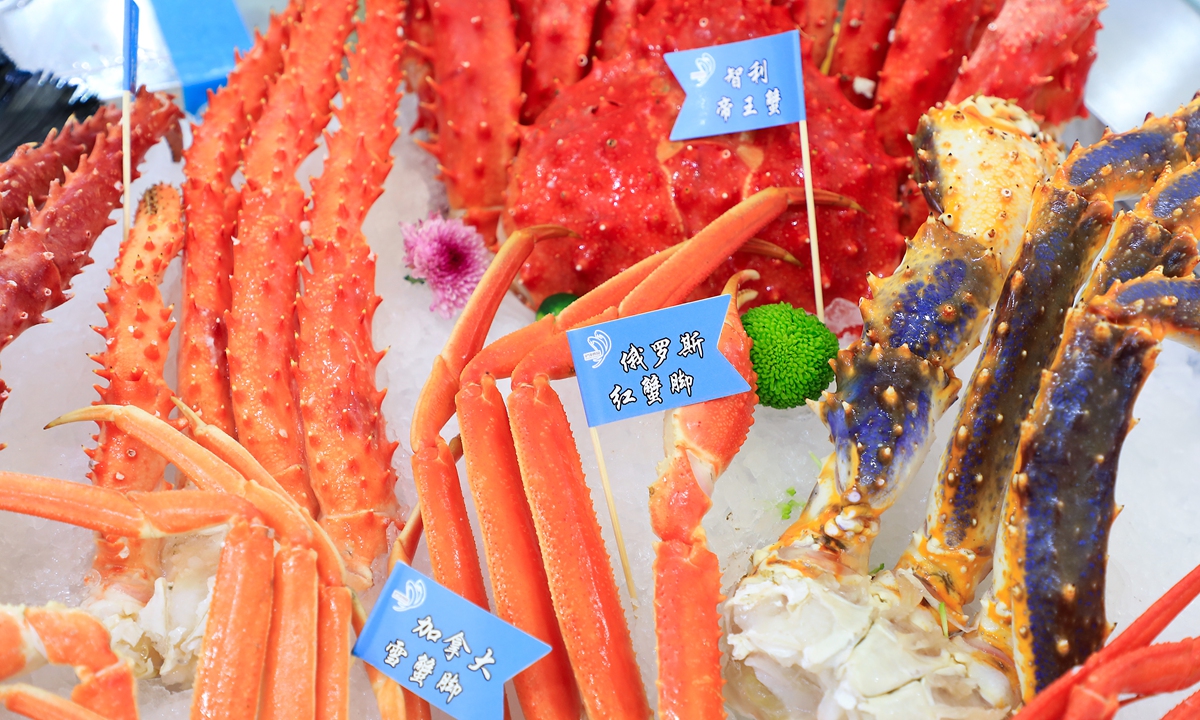
Aquatic products from all over the world will be exhibited at an industry trade fair in Shanghai in 2023. Photo: VCG
Japan’s seafood industry is still suffering a year after China suspended all imports of seafood from its neighbor due to food safety concerns over Tokyo’s plans to dump nuclear wastewater into the sea. At the same time, fish and seafood products from other countries have gained a significant share of the Chinese market, industry experts said on Sunday.
While Japan is calling for the ban to be lifted, Chinese officials and experts stressed that the move was to protect food safety and urged Tokyo to address serious concerns about nuclear-contaminated wastewater being discharged into the sea. Industry experts said Japan would continue to miss out on the ever-growing Chinese seafood market.
On August 24, 2023, China banned the import of all aquatic products from Japan after Japan began discharging nuclear-contaminated wastewater from the damaged Fukushima Daiichi nuclear power plant into the sea, despite serious concerns from China and the international community.
Following the move, Japan’s seafood exports to China, one of the largest seafood importers, plummeted, and Japan’s seafood industry suffered. While claiming that Japan’s scallop industry had overcome the crisis triggered by the ban, Japanese newspaper Asahi Shimbun reported on Sunday that frozen scallop stocks had risen and storage costs had increased losses.
Overall, Japan’s exports of marine products to China, including pearls and coral, fell from 87.1 billion yen ($592 million) in 2022 to 61 billion yen in 2023 and 3.5 billion yen in the first half of 2024, Reuters reported on Tuesday.
Fan Xubing, chairman of Seabridge Marketing, a China-based international fishing company and a seafood industry insider and analyst, said China’s ban on imports of Japanese seafood products has caused great losses to the Japanese seafood industry.
“The restriction did not have a major impact on the Chinese market because China does not rely too much on Japanese imports,” Fan told the Global Times on Sunday. “However, the loss of the Chinese market had a significant impact on relevant Japanese industries.”
While Japan’s fishing industry is suffering, seafood exports from other countries, including Russia, have increased significantly. For example, Russia’s seafood exports to China reached 1.29 million tons at the end of 2023, an all-time high, Russian news agency TASS reported on July 10.
Fan said China’s seafood market will continue to grow due to increasing consumption by Chinese consumers. “This has created a huge opportunity for foreign seafood companies,” he said, noting that Japan’s seafood industry will continue to miss out.
Zhou Yongsheng, deputy director of the Center for Japanese Studies at China Foreign Affairs University, said Japan was responsible for the losses of key Japanese industries by ignoring serious concerns and discharging nuclear-contaminated wastewater into the sea.
“Japan’s fishing industry will be able to tap into new markets such as the EU and the US to make up for some of the losses. However, the loss of the Chinese market would be a huge loss for Japan’s fishing industry,” Zhou told the Global Times on Sunday.
With losses mounting, Japan is calling for the ban to be lifted. However, Chinese officials stressed that the move was to protect food safety and called on Tokyo to address serious concerns about the discharge of nuclear-contaminated wastewater into the sea.
“The precautionary measures taken by China and some other countries in response to Japan’s move are aimed at protecting food safety and people’s health. These measures are completely legitimate, reasonable and necessary,” Mao Ning, a spokesman for China’s Foreign Ministry, said at a press conference on Friday in response to Japan’s call for the ban to be lifted.
Mao urged Japan to respond seriously to the concerns of the international and domestic communities, to fulfill its responsibilities and obligations, and to offer its full cooperation in establishing an independent international monitoring arrangement that would remain effective in the long term and in which Japan’s neighboring countries and other stakeholders would participate significantly.



